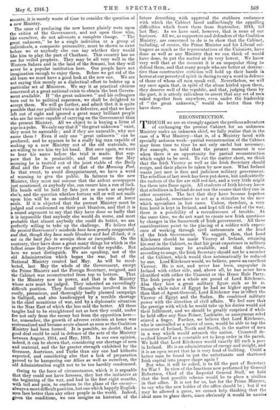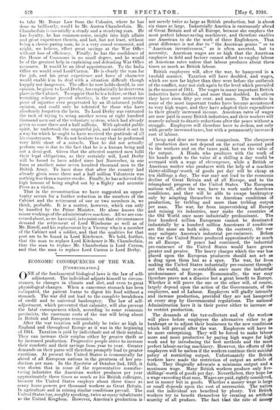RECONSTRUCTION.
THOUGH we are so strongly against the perilous adventure of exchanging the present Cabinet for "an- unknown Ministry under an unknown chief, we fully realize that in the case of a War Ministry—that is, of a Ministry faced :.with specially arduous work—partial reconstruction" of the Cabinet . may from time to time be not only useful but necessary. For example, we hold that the present moment is one when there is an opportunity for partial reconstruction which ought to be used. To cut the matter short, we think that the Irish Viceroy as well as the Irish .Secretary should resign, and their places be taken by new Men. "What Ireland wants just now is firm and judicious• military government. The rebellion of last week has been put down, but undonbtedly the embers of the fire are still red-hot, and a very little might fan them into flame again. All students of Irish history know that rebellions in Ireland do not run the course that they run in other countries. The fact that they have become hopeless seems, indeed, sometimes to act as a stimulus to the race which specializes in lost cases. Unless'' therefore, a very firm hand is kept in Ireland, and kept till the end of the war, there is a possibility of a recrudescence of trouble. • At the same time, we do not want to create new- Irish cfuestions by changes in the framework of Irish'gOverninent. -; All these considerations point to the placing of a soldier with experi- ence of working through civil instruments " at the head of the Irish Government. We suggeSt," then, that Lord Kitchener should be made Viceroy, of Ireland," retaining his seat in the Cabinet, so that his great experienee in military administration may be available, and " that the-refore, according to usage, the Irish Secretiry should not be a member of the Cabinet, which would thus auteniatically be reduced by one. Lord Kitchener would, we belieVe, preve an excellent Viceroy. He is not, and never has' been, unpopular in Ireland with. either side, and, above all, he has never been identified with either the Unionist or the' Horn-e Rule Party. The Irish people as a whole are proud of Lord Kitchener. Also they love a great military: figure such as he is. Though while ruler of Egypt he had no higher appellaVon than that of Agent-General, Lord Kitchener was in effectthe Viceroy of Egypt and the Sudan. He combined military power with the direction of civil affairs. We feel sure that , the prestige with which he would take up his &Aids wduld aid their fulfilment, and we should be greatly surprised if while he held office any Sinn Feiner, Larkinite, or anonymous rebel stirred a finger. Further, we believe that LOrd Kitchener, who is unrivalled as a raiser of Men, would be able to tap the resources of Ireland, North and South, in the matter of men 'in a way which would astonish the nation.- Cromwell de- scribed' himself as a constable set to keep order in the parish. We hold that Lord Kitchener would exactly fill such a post 'in Ireland. Ho is an administrator of energy and insight, and it is an open secret that he is very fond of building. . Could a better man be found to put the unfortunate and shattered .Irish capital into proper shape again ? But who, it will be asked, is to fill the post of Secretary for War ? In view of the functions now performed by General Robertson, Chief of the Imperial General Staff,' we hold that the best possible scheme would be to place a civilian in that office. It is not for us, but for the Prime Minister, to say who the new holder of the office should be ; but if we may be allowed a guess, we cannot help thinking that the ideal man to place there, since obviously it would be unwise' to take Mr. Boner Law from the Colonies, where he has clone so brilliantly, woull. be Mr. Austen Chamberlain. Mr. Chambei lain is essentially a steady and a steadying man. He has loyalty, he has common-sense, insight into high affairs and great experience therein, and last, but not least, without being a cheese-paring man, he is a very sound economist, and might, we believe, effect great savings at the War Office without loss of efficiency. Finally, he has the confidence of the House of Commons in no small degree, and he would be of the greatest help in explaining and defending War Office measures. It would be an ideal appointment. To the India Office we would send Lord Curzon. He is clearly the man for the job, and his great experience and force of character would enable to deal with a situation difficult • though happily not dangerous. The office he now holds should, in our opinion, be given to Lord Derby, for emphatically he deserves a place in the Cabinet. To suggest that he is a failure, or that his recruiting scheme proved abortive, is the most monstrous piece of injustice ever perpetrated by an ill-informed public opinion, and could only be tolerated by those who have absolutely forgotten the facts. To Lord Derby was entrusted the task of trying to wring another seven or eight hundred thousand men out of the voluntary system, which had already given us some three and a half millions. With splendid public spirit, he undertook the ungrateful job, and carried it out in a way for which he ought to have received the gratitude of all his countrymen. We do not hesitate to say that he performed very little short of a miracle. That he did not actually perform one is due to the fact that he is a human being and not a demi-god. Given that the attested married men fulfil their legal obligations, as they certainly will, Lord Derby will be found to have added since last November, in one form or another, some seven hundred thousand men to the British Army. To have done that after the country had already given some three and a half million Volunteers was nothing less than a master-stroke. Finally, he has achieved the high honour of being singled out by a flighty and neurotic Press as a victim.
That in the reconstruction we have suggested an oppor- tunity occurs for a further reduction in the numbers of the Cabinet and the retirement of one or two members .is, we think, probable. It is a matter, however, which can only be handled by the Prime Minister. He alone knows the minor workings of the administrative machine. All we are con- cerned about, as we have said, is to point out that circumstances demand the retirement of Lord Wimborne as well as of Mr. Birrell, and his replacement by a Viceroy who is a member of the Cabinet and a soldier, and that the qualities for that post are to be found in Lord Kitchener. We hold, further, that the man to replace Lord Kitchener is Mr. Chamberlain, that the man to replace Mr. Chamberlain is Lord Curzon, and that the man to replace Lord Curzon is Lord Derby.































 Previous page
Previous page